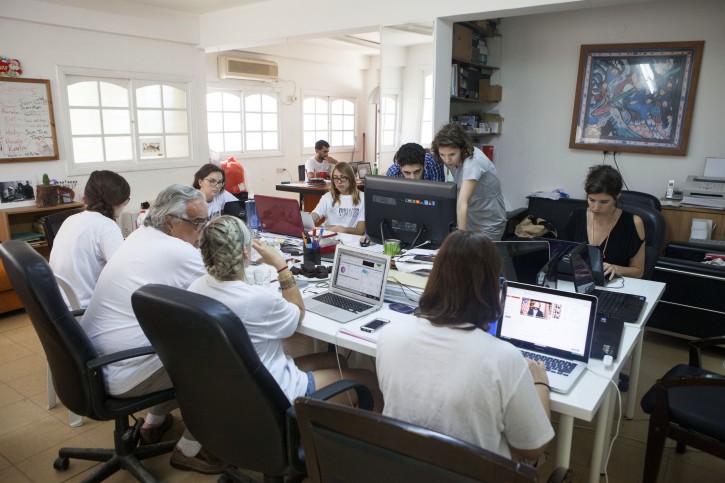
Tel Aviv – Four years ago, disillusioned former peace negotiator Uri Savir launched a Facebook group aimed at bringing together moderate voices from Israel and across the Arab world. Now he’s celebrating his vision with a near million-strong online movement stretching across the Middle East’s most hostile borders.
Savir’s YaLa Young Leaders program was set to mark the arrival of its millionth member on Thursday with an online conference attended by U.N. Secretary-General Ban Ki-moon, chief European Union diplomat Federica Mogherini and dozens of other VIPs. Amid repeated failures to reach peace, Savir turned to the youth in one last Internet-based push to achieve peace. He said the outpouring of support by young Israelis and Arabs across the Middle East made him the region’s “last optimist.”
“The political leadership did not involve our constituencies enough in the peacemaking,” said Savir, 62, who was Israel’s chief negotiator in the 1993 Oslo Peace Accords with the Palestinians. “YaLa is a correction of that. It’s much more important for Arab and Israelis to study together than for me to sit 500 hours with Yasser Arafat. This is what I believe today. I didn’t understand it 20 years ago.”
Savir said peace needs “passion and patience,” and he sees YaLa as a critical part of this process to create a new generation attuned to co-existence.
At Thursday’s event, YaLa members from Iraq to Sudan to Israel engaged in online chats for the organization’s fourth annual online conference. Meanwhile, the small YaLa team in a Tel Aviv basement office streamed video messages from over 50 of the world’s top political, cultural and economic leaders, including American celebrity Sharon Stone and South African Archbishop Desmond Tutu.
Savir called YaLa members “a voice of sanity” and “a new silent majority” in a region roiled in turmoil. “They are the future leaders,” he said.
Despite the collapse of several rounds of Israeli-Palestinian peace talks, Savir said he still stood by key components of the peace process. “I believe that ultimately there will be a two-state solution. I believe that a majority wants peaceful co-existence.”
Savir founded YaLa in 2011, inspired by the online activism that accompanied the Arab Spring uprisings.
Over 1,200 students have participated in the organization’s two online courses in conflict resolution and citizen journalism. The Facebook supporters include a quarter million Egyptians, 200,000 from North Africa, 40,000 Israelis, and 40,000 Palestinians — 10,000 of them from Gaza, according to Savir. YaLa’s tumblr page provides members another platform to share their stories and experiences.
Still, with its direct ties to Israel and support from European and American governments, YaLa remains a tough sell at a time when many Palestinians resist normalization with Israel and engage in efforts to boycott it instead.
Hamze Awawde, a 25-year-old YaLa organizer from Ramallah said he joined YaLa out of curiosity. He also knows that interacting with the movement on Facebook, let alone participating in face-to-face co-existence initiatives, could cause him trouble.
“I know it’s not free of risk, but maybe it was the least risky among my friends with what they are doing with their lives,” said Awawde, mentioning the attraction of drugs and violence.
As reported by Vos Iz Neias
